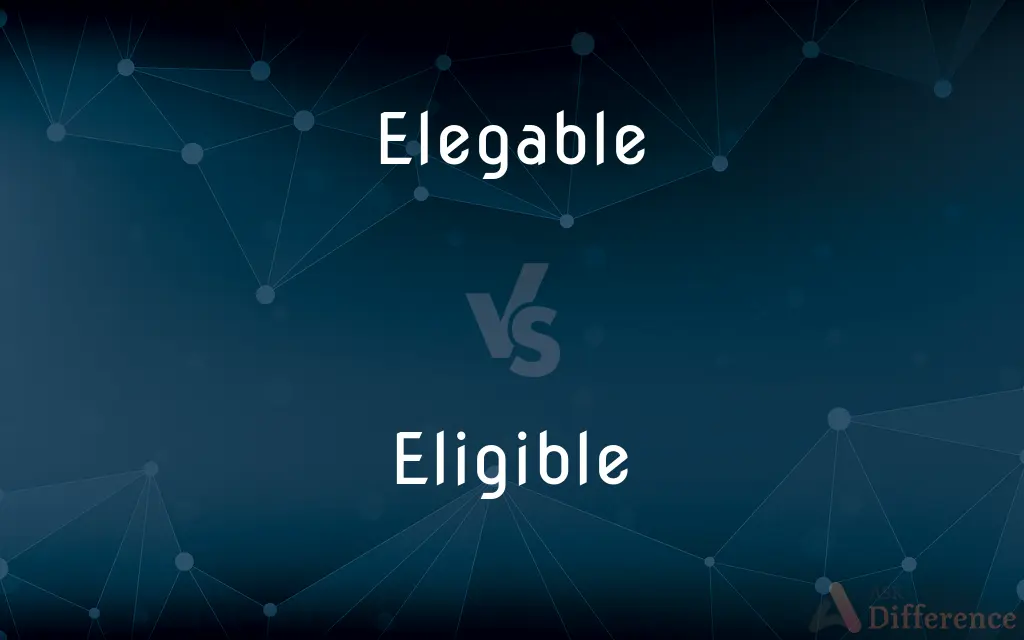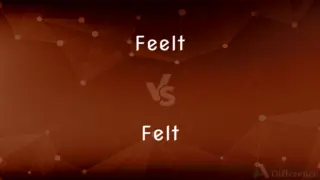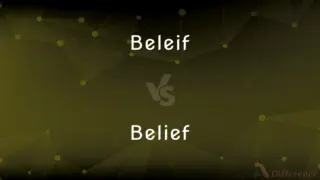Elegable vs. Eligible — Which is Correct Spelling?
Edited by Tayyaba Rehman — By Fiza Rafique — Updated on April 1, 2024
"Elegable" is an incorrect spelling; the correct form is "eligible." Eligible means having the right to do or obtain something.

Table of Contents
Which is correct: Elegable or Eligible
How to spell Eligible?

Elegable
Incorrect Spelling

Eligible
Correct Spelling
ADVERTISEMENT
Key Differences
"Eleg-" often refers to elegance, whereas "elig-" ties to qualifications.
Think of "eligibility" and recall "eligible" has the same start.
Remember that "eligible" has a similar structure to "intelligible."
There's no 'a' between 'g' and 'b' in the correct spelling.
Visualize "eligible voters" to remember the correct context.
ADVERTISEMENT
How Do You Spell Eligible Correctly?
Incorrect: To be elegable for the offer, you must meet certain criteria.
Correct: To be eligible for the offer, you must meet certain criteria.
Incorrect: The team was not elegable to enter the tournament last year.
Correct: The team was not eligible to enter the tournament last year.
Incorrect: Are you elegable to participate in the competition?
Correct: Are you eligible to participate in the competition?
Incorrect: She wasn't elegable for the discount offered by the store.
Correct: She wasn't eligible for the discount offered by the store.
Incorrect: He was considered elegable for the scholarship.
Correct: He was considered eligible for the scholarship.
Eligible Definitions
Eligible can mean suitable or worthy of a choice.
The book is eligible for the award.
Eligible denotes meeting specific requirements.
She became eligible for the scholarship after maintaining her GPA.
Eligible signifies the quality of being chosen for a particular role or task.
Only eligible candidates were interviewed for the job.
Qualified or entitled to be chosen
Eligible to run for office.
Eligible for retirement.
Desirable and worthy of choice, especially for marriage
An eligible bachelor.
(Football) Allowed under the rules to catch a forward pass.
A person who is eligible.
Allowed to and meeting the necessary conditions required to participate in or be chosen for something
Worthy of being chosen (for marriage).
One who is eligible.
That may be selected; proper or qualified to be chosen; legally qualified to be elected and to hold office.
Worthy to be chosen or selected; suitable; desirable; as, an eligible situation for a house.
The more eligible of the two evils.
Qualified for or allowed or worthy of being chosen;
Eligible to run for office
Eligible for retirement benefits
An eligible bachelor
Prohibited by official rules;
An eligible pass receiver
Eligible refers to having the right to do or obtain something.
He's eligible to vote in the upcoming election.
Eligible can describe someone fitting for marriage or a relationship.
He's the most eligible bachelor in town.
Eligible Meaning in a Sentence
Veterans are eligible for certain benefits under this program.
You must be a resident to be eligible for the library card.
Students who maintain a B average are eligible for the honor roll.
Children under 12 are eligible for free admission to the museum.
Only customers over 18 are eligible for this credit card offer.
Pets adopted from shelters are eligible for a free vet visit.
She became eligible for retirement benefits at the age of 65.
The house is eligible for historic landmark status.
To be eligible for the contest, you must submit your entry by Friday.
First-time homebuyers are eligible for a special loan program.
Members are eligible for discounts at all partner stores.
The program is only eligible to citizens and permanent residents.
You are eligible for a free upgrade if you purchased your phone within the last year.
To be eligible for the scholarship, students must write an essay.
Applicants must have a valid ID to be eligible for enrollment.
Cars older than 20 years are not eligible for the insurance discount.
Only products purchased online are eligible for free shipping.
To be eligible for the rebate, you must fill out the online form.
Participants must pass a preliminary round to be eligible for the finals.
Families with low income are eligible for the housing assistance program.
Athletes found guilty of doping are not eligible to compete.
New subscribers are eligible for a one-month free trial.
To be eligible for the prize, you must answer all questions correctly.
Employees who have worked for the company for over a year are eligible for paid vacation.
Students are eligible for a discount on public transportation.
Eligible Idioms & Phrases
Eligible bachelor
A man who is not married and is considered to be a desirable potential partner.
He's considered one of the city's most eligible bachelors.
Eligible for parole
Qualifying for early release from prison under specific conditions.
After serving five years, he became eligible for parole.
Age-eligible
Meeting the age requirement for something.
At 16, she's age-eligible to apply for her driver's permit.
Common Curiosities
Which vowel is used before eligible?
The indefinite article "an" is used before "eligible."
Why is it called eligible?
It's called "eligible" because it originates from the Latin word "eligibilis," meaning "selectable."
Which preposition is used with eligible?
"For" is commonly used, as in "eligible for the position."
What is the pronunciation of eligible?
It's pronounced as /ˈɛlɪdʒəbəl/.
What is the verb form of eligible?
There isn't a direct verb form, but "qualify" is a related action.
What is the root word of eligible?
The root word is the Latin "eligere," meaning "to choose."
What is the singular form of eligible?
The singular form is "eligible."
Which article is used with eligible?
Both "a" and "an" can be used, depending on the sentence context.
Is eligible a negative or positive word?
It's neutral but often used in a positive context.
Is eligible a countable noun?
No, "eligible" is an adjective, not a noun.
What is the plural form of eligible?
The word "eligible" doesn't have a traditional plural form as it's an adjective, but you can have "eligible candidates" or "eligible participants."
Is eligible an abstract noun?
No, it's an adjective.
Is eligible a collective noun?
No, it's not a collective noun.
How many syllables are in eligible?
There are four syllables.
What part of speech is eligible?
Eligible is an adjective.
Which conjunction is used with eligible?
Any conjunction can be used, depending on the sentence, like "and" or "or."
What is the first form of eligible?
As an adjective, "eligible" is its base form.
Is the word eligible imperative?
No, "eligible" is not imperative; it's an adjective.
How do we divide eligible into syllables?
El-i-gi-ble.
What is a stressed syllable in eligible?
The first syllable "el" is stressed.
What is another term for eligible?
Another term could be "qualified."
What is the second form of eligible?
Eligible is an adjective and doesn't have verb forms.
Is eligible a noun or adjective?
Eligible is an adjective.
Is eligible an adverb?
No, it's not an adverb.
What is the opposite of eligible?
The opposite could be "ineligible" or "unqualified."
Is eligible a vowel or consonant?
"Eligible" is a word, not a single letter. It starts with a vowel sound.
Is the eligible term a metaphor?
No, but it can be used metaphorically in specific contexts.
Which determiner is used with eligible?
Determiners like "this," "that," "my," and "our" can be used, depending on context.
What is the third form of eligible?
Eligible, being an adjective, doesn't have verb forms.
How is eligible used in a sentence?
"After reviewing her credentials, we determined she was eligible for the position."
Share Your Discovery

Previous Comparison
Feelt vs. Felt
Next Comparison
Beleif vs. BeliefAuthor Spotlight
Written by
Fiza RafiqueFiza Rafique is a skilled content writer at AskDifference.com, where she meticulously refines and enhances written pieces. Drawing from her vast editorial expertise, Fiza ensures clarity, accuracy, and precision in every article. Passionate about language, she continually seeks to elevate the quality of content for readers worldwide.
Edited by
Tayyaba RehmanTayyaba Rehman is a distinguished writer, currently serving as a primary contributor to askdifference.com. As a researcher in semantics and etymology, Tayyaba's passion for the complexity of languages and their distinctions has found a perfect home on the platform. Tayyaba delves into the intricacies of language, distinguishing between commonly confused words and phrases, thereby providing clarity for readers worldwide.







































